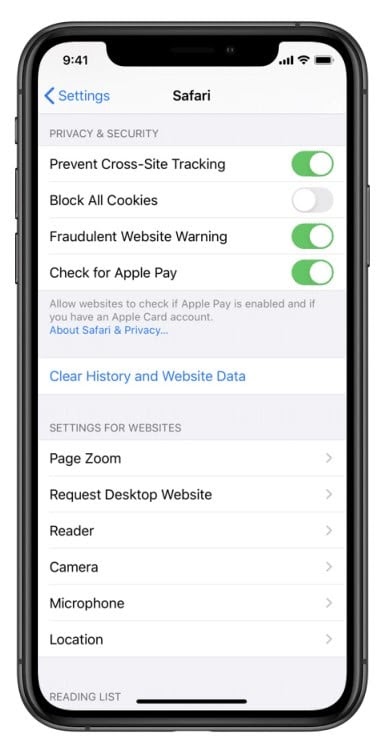What Advertisers Need to Know About Apple’s & Facebook’s Changes

Anyone who’s advertising on Facebook Ads has been seeing plenty of updates about the feud that’s going on between Apple and Facebook over the past few months. In this post, we will try to walk you through what they are quarreling about, why you should care, and what can you do to keep your campaigns performing well.
What’s been happening
This recent conflict stems a long while back, to the days Apple released their first iPhone. From the get-go, Apple’s native browser enforced more robust privacy measures on the device, to maintain its user’s privacy. These limitations included a stricter capping of cookie duration and other methods that historically made Apple users harder to target, despite being a highly desired audience.
As Apple’s devices grew in popularity, additional measures were added to Apple devices’ App and Web ecosystems. This continued to limit measurement and blocked shady tracking techniques (e.g. fingerprinting and cookie matching).
However, the recent changes that are expected to be introduced in iOS 14.5 and macOS 11 are nothing short of a revolution.
Apple’s new protocols (ATT – App Tracking Transparency, that focus on mobile apps & PCM – Private Click Measurement that focus on websites), though slightly different when applied to Web or Apps, state that there shouldn’t be a direct linkage between a user and the ad click event, blocking the ads platforms (like Facebook) to identify a specific user.
They claim that an advertiser should only know that some user clicked an ad and that some user converted on their site. While this seems relatively trivial, the underlying concept here is that the advertiser will report only on the campaign level metrics, i.e. Campaign A had 100 clicks and five conversions. Any granular reporting beyond that, e.g. which ad set, or specific ad converted, or which user demographic converted, will not be shown.
While the ATT protocol requires that users actively opt-in to be tracked (with limitations described above), the PCM protocol will default on the Safari browser.
This change will impact all advertising platforms, not just Facebook, but they have been loudest about it.
Their response was two-fold: First, they lashed out publicly at Apple, saying they will ruin SMB marketing that got hit during COVID.
Second, they introduced their protocol, Aggregated Event Measurement (AEM), similar to Apple’s, while still retaining some critical capabilities required to optimize ad serving, hoping that the industry would adopt it as its standard.
How will it impact you?
While both protocols are still in the works, and it remains unclear which of them will prevail, the general direction of both is quite similar:
- Limited event tracking
- Limited attribution windows
- Delayed campaign reporting (up to 72 hours)
- Campaign reporting will be modeled to the ad set/ad group level only
- User attribute breakdowns (demographics, interests, etc.) will be deprecated
- Remarketing audiences’ sizes will reduce
Let’s break it down:
Limited event reporting
Apple’s protocol, and accordingly, Facebook’s, suggest that advertisers can report only 8 types of conversion events. These include any user interaction on the site, e.g. Purchase, Lead, Add to Cart, etc., unlike today where there is no such limit.
In Apple’s protocol, these events will also be unable to capture event parameters, such as the name and value of the item purchased. This, in practice, will remove the option for ROAS optimization in campaigns.
Limited attribution windows
The campaign data stored by Apple devices (using the browser and device’s storage, not cookies) will be limited to 7 days. This will restrict campaign attribution to a 7-day click window. View-through conversion attribution is still under consideration, but for the time being, Facebook has decided to use statistical modeling to bridge this gap, offering a limited 1-day view-through conversion window.
Delayed campaign reporting
To keep the ad platforms from manipulating the protocols, the reporting will be delayed randomly by 24-48 hours. Additionally, Facebook plans to add 24 hours for data processing due to the heavy statistical modeling happening in the background. This means that campaign reports might lag almost three days and measuring the impact of your ads’ changes will become painfully slow.
Campaign reporting will be modeled to the ad set/ad group level only
As described above, both Apple and Facebook’s protocols report only on campaign level conversions. Since campaigns have in practice multiple levels, i.e. Campaign – Ad group/Ad set – Ad, Facebook will use, again, statistical modeling to extrapolate the data to the ad set level. This will give some limited granularity to the campaign and be very far from the detailed reports we’re used to seeing.
User attribute breakdowns will be deprecated from reporting
With reporting detached from the user, no breakdowns will be available in campaign reporting. So, while you can still target a specific demographic (as that data is known to the ad platform for serving the ad), you will probably only have information on which ad clicked the most and won’t be able to pair that with an actual demographic group. For example, you can target female shoppers of ages 25-45 from California but won’t be able to break down your conversion reports to identify if you’ve received more conversions in Los Angeles than in Sacramento.
Say goodbye to campaigns breakdown.
Remarketing audiences’ size will reduce for Safari users
With the absence of data about user actions taken on your site and app, remarketing audiences are expected to shrink for Safari users. While it’s still unclear whether there will be a mechanism to track users that aren’t originating from campaigns (e.g. Organic traffic), we expect the audience to be smaller for Safari users.
According to Apple, there will be no change to Chrome or In-App browsers (like Facebook’s browser)
What can you do about it?
To be honest, as a campaign manager, all the above sound quite terrible. In a separate post in this series, I’ll touch on the specific campaign-related tactics you can use to overcome some of these challenges.
In this post, I wanted to suggest some general concepts I believe you should adopt.
Follow Facebook’s best practices
While this might sound trivial, these will give you the most value in an immediate way.
Implement Facebook’s Conversion API (server to server tracking). There are plenty of good plugins out there for a code-free implementation of this, and even an in-house development of this feature isn’t too much of a hassle for a decent developer.
I also recommend using their Offline Conversions API which allows you to report on delayed conversions, e.g. a Lead converting after an in-person meeting. The offline conversions are mainly based on PII (Personal Identifiable Information) from your CRM/eCommerce platform like email or phone numbers, and we do not expect them to be impacted by Apple’s changes. Note that you can use them for reporting but not as an optimization event.
Both are recommended best practices regardless of the new protocols, as they improve reporting accuracy.
Another important action is verifying your domain and business. This can be done in your Business Manager admin area under Business settings – Brand safety – Domain. Once your domain has been verified, you can select and prioritize the eight events Facebook will use for optimizing campaigns. These will also be selected automatically by Facebook for your business if you don’t select them yourself.
Diversify spend
With limitations coming to all platforms, now is as good a time as ever to experiment with new ad platforms. If Facebook enforces these strict measures, maybe Pinterest will make up for some of it, and maybe Taboola or Outbrain will be more lucrative channels now.
This too is a recommended practice regardless of the new protocols, but with these limitations, it becomes critical you spread your risk across several platforms.
Measure elsewhere
With campaign reporting limited, we expect web analytics tools to be on the rise. These include the platforms’ built-in solutions, e.g. Shopify’s internal dashboard, along with other 3rd party solutions (relying on your 1st party data, of course).
The flip side is that most of these tools use simpler attribution models, primarily last touch attribution.
To prepare best for this, try analyzing past performance by comparing conversions measured in Facebook Ads versus ones measured in Google Analytics. The reporting in Facebook Ads is likely to be higher, and with sufficient data, you will get an estimate of your “hidden multiplier”, i.e. how many conversions were impacted by Facebook as compared to direct conversions from Facebook. This number will help in giving credit to the ad platform that goes beyond just the direct conversions measured.
Future outlook
This change is yet to happen. While there has been a lot of fussing about it, it hasn’t yet been released, and Apple has reportedly said it would happen in “early spring”. I do believe that there will be some changes to all protocols before this goes live.
One change we can already expect is Facebook’s response to Apple’s Beta release of iOS 14.5 on February 1st. The release featured a surprisingly more relaxed version of the PCM protocol (the privacy protocol for websites), which now offers App to Web tracking and a larger cap of 16 conversion events. We expect Facebook to respond to these changes and relax the limitations on their AEM protocol.
As a result of these protocols, we also expect several major changes in the industry are going forward.
Rise of the Walled Gardens campaigns
What happens on Facebook, well, stays on Facebook. And Facebook has quite a sophisticated set of tools they can offer marketers to engage their users within Facebook and even complete the actual conversion.
Solutions such as Lead Forms and Canvas have been around for a while now. Facebook is now heavily pushing its eCommerce solutions like Facebook Shops, Instagram Shopping and WhatsApp Business solution that already started in India. Those solutions will enable a complete checkout flow from within the platform from the impressions level until the purchase.
Similar solutions are being offered by Google, including the recent release of Shop with Google and the expected shopping experience within YouTube, so we can expect them to promote these heavily too.
Keeping the users within the walled gardens gives the ad platforms full visibility to the campaign and conversion data, which can then be used to optimize and report.
Moving away from ROAS
As campaign reporting becomes limited, brands will need to shift their measurement from down funnel metrics such as ROAS. Suppose sophisticated brands were previously moving the discussion to lift measurement (a movement that will continue despite these changes). In that case, they will now also have to consider more “classic” marketing metrics such as Share of Voice and Share of Wallet. This can be a positive outcome, widening the focus from strictly tactical metrics to more strategic ones.
Facebook Faces Yet Another Outage: Platform Encounters Technical Issues Again

Uppdated: It seems that today’s issues with Facebook haven’t affected as many users as the last time. A smaller group of people appears to be impacted this time around, which is a relief compared to the larger incident before. Nevertheless, it’s still frustrating for those affected, and hopefully, the issues will be resolved soon by the Facebook team.
Facebook had another problem today (March 20, 2024). According to Downdetector, a website that shows when other websites are not working, many people had trouble using Facebook.
This isn’t the first time Facebook has had issues. Just a little while ago, there was another problem that stopped people from using the site. Today, when people tried to use Facebook, it didn’t work like it should. People couldn’t see their friends’ posts, and sometimes the website wouldn’t even load.
Downdetector, which watches out for problems on websites, showed that lots of people were having trouble with Facebook. People from all over the world said they couldn’t use the site, and they were not happy about it.
When websites like Facebook have problems, it affects a lot of people. It’s not just about not being able to see posts or chat with friends. It can also impact businesses that use Facebook to reach customers.
Since Facebook owns Messenger and Instagram, the problems with Facebook also meant that people had trouble using these apps. It made the situation even more frustrating for many users, who rely on these apps to stay connected with others.
During this recent problem, one thing is obvious: the internet is always changing, and even big websites like Facebook can have problems. While people wait for Facebook to fix the issue, it shows us how easily things online can go wrong. It’s a good reminder that we should have backup plans for staying connected online, just in case something like this happens again.
Christian family goes in hiding after being cleared of blasphemy

LAHORE, Pakistan — A court in Pakistan granted bail to a Christian falsely charged with blasphemy, but he and his family have separated and gone into hiding amid threats to their lives, sources said.
Haroon Shahzad, 45, was released from Sargodha District Jail on Nov. 15, said his attorney, Aneeqa Maria. Shahzad was charged with blasphemy on June 30 after posting Bible verses on Facebook that infuriated Muslims, causing dozens of Christian families in Chak 49 Shumaali, near Sargodha in Punjab Province, to flee their homes.
Lahore High Court Judge Ali Baqir Najfi granted bail on Nov. 6, but the decision and his release on Nov. 15 were not made public until now due to security fears for his life, Maria said.
Shahzad told Morning Star News by telephone from an undisclosed location that the false accusation has changed his family’s lives forever.
“My family has been on the run from the time I was implicated in this false charge and arrested by the police under mob pressure,” Shahzad told Morning Star News. “My eldest daughter had just started her second year in college, but it’s been more than four months now that she hasn’t been able to return to her institution. My other children are also unable to resume their education as my family is compelled to change their location after 15-20 days as a security precaution.”
Though he was not tortured during incarceration, he said, the pain of being away from his family and thinking about their well-being and safety gave him countless sleepless nights.
“All of this is due to the fact that the complainant, Imran Ladhar, has widely shared my photo on social media and declared me liable for death for alleged blasphemy,” he said in a choked voice. “As soon as Ladhar heard about my bail, he and his accomplices started gathering people in the village and incited them against me and my family. He’s trying his best to ensure that we are never able to go back to the village.”
Shahzad has met with his family only once since his release on bail, and they are unable to return to their village in the foreseeable future, he said.
“We are not together,” he told Morning Star News. “They are living at a relative’s house while I’m taking refuge elsewhere. I don’t know when this agonizing situation will come to an end.”
The Christian said the complainant, said to be a member of Islamist extremist party Tehreek-e-Labbaik Pakistan and also allegedly connected with banned terrorist group Lashkar-e-Jhangvi, filed the charge because of a grudge. Shahzad said he and his family had obtained valuable government land and allotted it for construction of a church building, and Ladhar and others had filed multiple cases against the allotment and lost all of them after a four-year legal battle.
“Another probable reason for Ladhar’s jealousy could be that we were financially better off than most Christian families of the village,” he said. “I was running a successful paint business in Sargodha city, but that too has shut down due to this case.”
Regarding the social media post, Shahzad said he had no intention of hurting Muslim sentiments by sharing the biblical verse on his Facebook page.
“I posted the verse a week before Eid Al Adha [Feast of the Sacrifice] but I had no idea that it would be used to target me and my family,” he said. “In fact, when I came to know that Ladhar was provoking the villagers against me, I deleted the post and decided to meet the village elders to explain my position.”
The village elders were already influenced by Ladhar and refused to listen to him, Shahzad said.
“I was left with no option but to flee the village when I heard that Ladhar was amassing a mob to attack me,” he said.
Shahzad pleaded with government authorities for justice, saying he should not be punished for sharing a verse from the Bible that in no way constituted blasphemy.
Similar to other cases
Shahzad’s attorney, Maria, told Morning Star News that events in Shahzad’s case were similar to other blasphemy cases filed against Christians.
“Defective investigation, mala fide on the part of the police and complainant, violent protests against the accused persons and threats to them and their families, forcing their displacement from their ancestral areas, have become hallmarks of all blasphemy allegations in Pakistan,” said Maria, head of The Voice Society, a Christian paralegal organization.
She said that the case filed against Shahzad was gross violation of Section 196 of the Criminal Procedure Code (CrPC), which states that police cannot register a case under the Section 295-A blasphemy statute against a private citizen without the approval of the provincial government or federal agencies.
Maria added that Shahzad and his family have continued to suffer even though there was no evidence of blasphemy.
“The social stigma attached with a blasphemy accusation will likely have a long-lasting impact on their lives, whereas his accuser, Imran Ladhar, would not have to face any consequence of his false accusation,” she said.
The judge who granted bail noted that Shahzad was charged with blasphemy under Section 295-A, which is a non-cognizable offense, and Section 298, which is bailable. The judge also noted that police had not submitted the forensic report of Shahzad’s cell phone and said evidence was required to prove that the social media was blasphemous, according to Maria.
Bail was set at 100,000 Pakistani rupees (US $350) and two personal sureties, and the judge ordered police to further investigate, she said.
Shahzad, a paint contractor, on June 29 posted on his Facebook page 1 Cor. 10:18-21 regarding food sacrificed to idols, as Muslims were beginning the four-day festival of Eid al-Adha, which involves slaughtering an animal and sharing the meat.
A Muslim villager took a screenshot of the post, sent it to local social media groups and accused Shahzad of likening Muslims to pagans and disrespecting the Abrahamic tradition of animal sacrifice.
Though Shahzad made no comment in the post, inflammatory or otherwise, the situation became tense after Friday prayers when announcements were made from mosque loudspeakers telling people to gather for a protest, family sources previously told Morning Star News.
Fearing violence as mobs grew in the village, most Christian families fled their homes, leaving everything behind.
In a bid to restore order, the police registered a case against Shahzad under Sections 295-A and 298. Section 295-A relates to “deliberate and malicious acts intended to outrage religious feelings of any class by insulting its religion or religious beliefs” and is punishable with imprisonment of up to 10 years and fine, or both. Section 298 prescribes up to one year in prison and a fine, or both, for hurting religious sentiments.
Pakistan ranked seventh on Open Doors’ 2023 World Watch List of the most difficult places to be a Christian, up from eighth the previous year.
Morning Star News is the only independent news service focusing exclusively on the persecution of Christians. The nonprofit’s mission is to provide complete, reliable, even-handed news in order to empower those in the free world to help persecuted Christians, and to encourage persecuted Christians by informing them that they are not alone in their suffering.
Free Religious Freedom Updates
Join thousands of others to get the FREEDOM POST newsletter for free, sent twice a week from The Christian Post.
Individual + Team Stats: Hornets vs. Timberwolves
CHARLOTTE HORNETS MINNESOTA TIMBERWOLVES You can follow us for future coverage by liking us on Facebook & following us on X: Facebook – All Hornets X – …
Source link
-

 MARKETING7 days ago
MARKETING7 days agoRoundel Media Studio: What to Expect From Target’s New Self-Service Platform
-

 SEO6 days ago
SEO6 days agoGoogle Limits News Links In California Over Proposed ‘Link Tax’ Law
-
SEARCHENGINES6 days ago
Daily Search Forum Recap: April 12, 2024
-

 SEO5 days ago
SEO5 days ago10 Paid Search & PPC Planning Best Practices
-

 SEARCHENGINES5 days ago
SEARCHENGINES5 days agoGoogle Core Update Volatility, Helpful Content Update Gone, Dangerous Google Search Results & Google Ads Confusion
-

 MARKETING6 days ago
MARKETING6 days ago2 Ways to Take Back the Power in Your Business: Part 2
-

 MARKETING4 days ago
MARKETING4 days ago5 Psychological Tactics to Write Better Emails
-

 SEARCHENGINES4 days ago
SEARCHENGINES4 days agoWeekend Google Core Ranking Volatility














